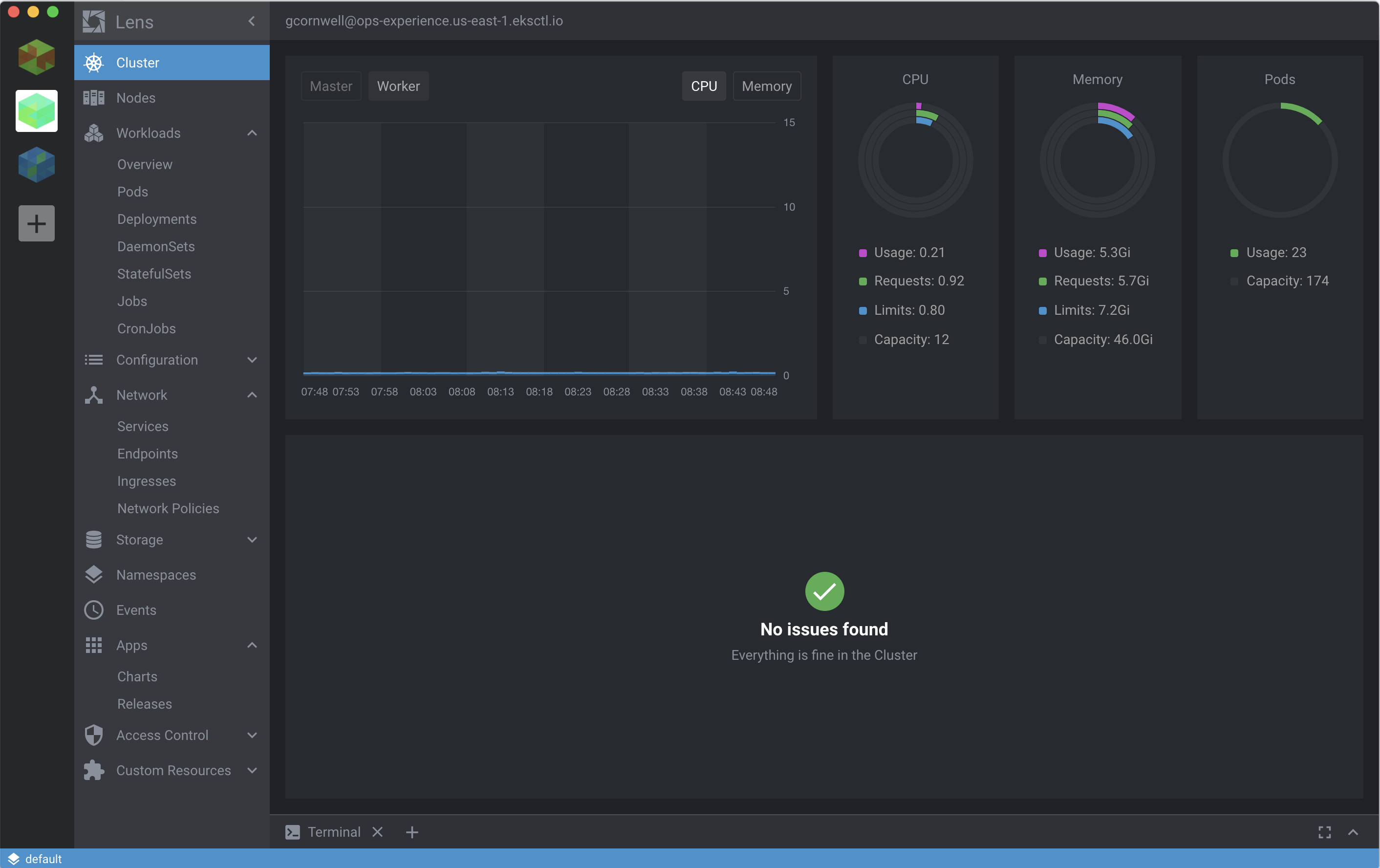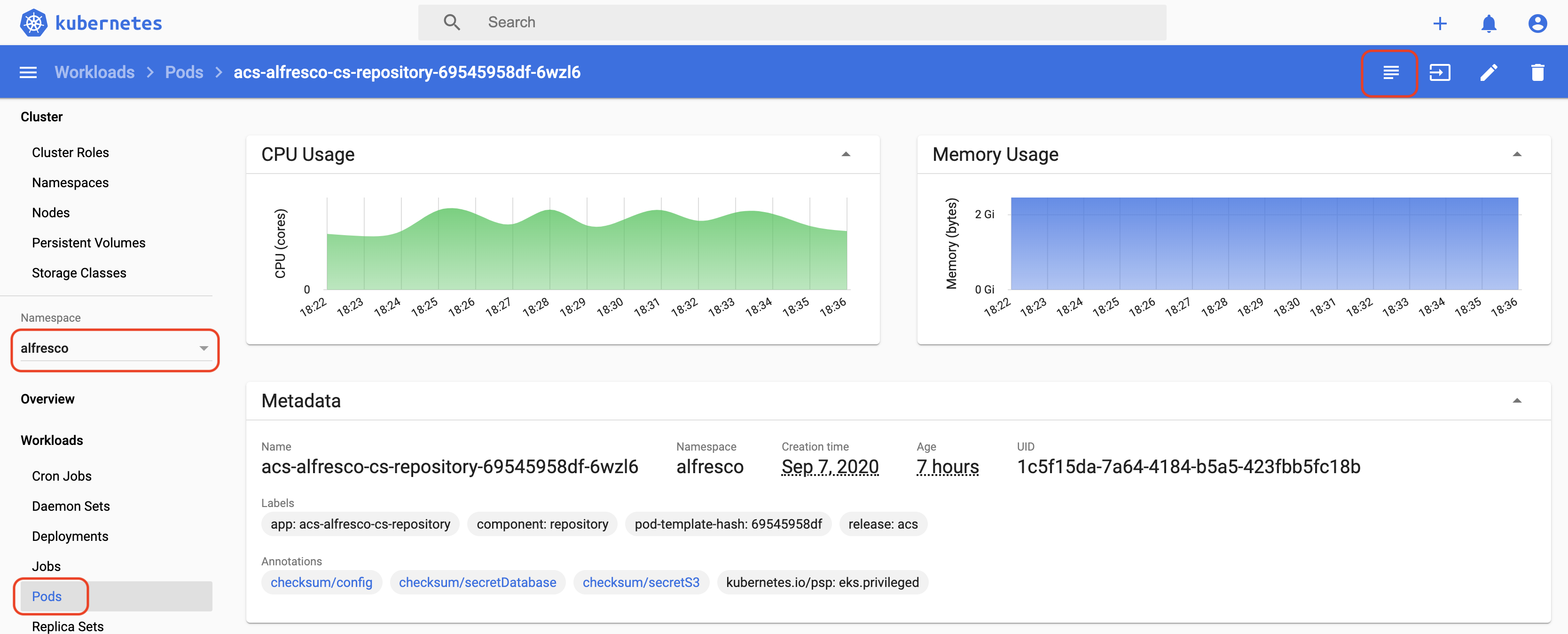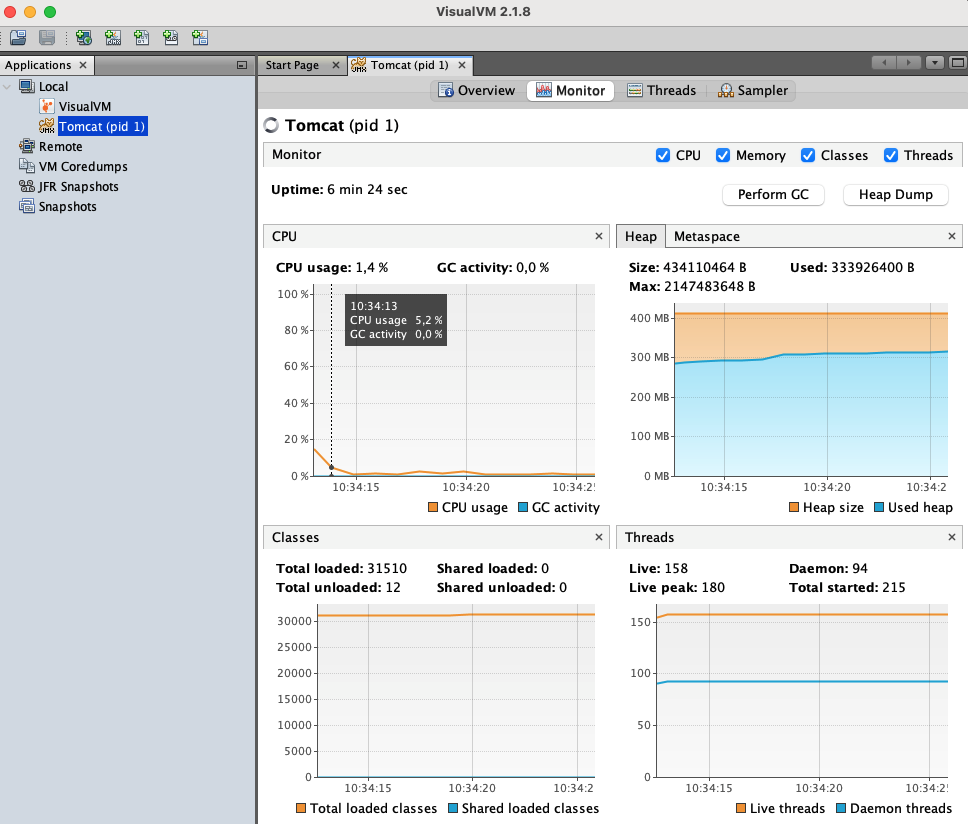Alfresco Content Services Helm Deployment
Alfresco Content Services (ACS) is an Enterprise Content Management (ECM) system that is used for document and case management, project collaboration, web content publishing, and compliant records management. The flexible compute, storage, and database services that Kubernetes offers make it an ideal platform for Alfresco Content Services. This helm chart presents an enterprise-grade Alfresco Content Services configuration that you can adapt to virtually any scenario with the ability to scale up, down or out, depending on your use case.
The Helm chart in this repository supports deploying the Enterprise or Community Edition of ACS.
Architectures
Enterprise edition
The Enterprise configuration will deploy the following system (Alfresco Transform Service and Alfresco Search Enterprise are detailed in the next diagrams):
graph LR
classDef alf fill:#0b0,color:#fff
classDef k8s fill:#326ce5,stroke:#326ce5,stroke-width:2px,color:#fff
classDef thrdP fill:#e098a6,color:#000
Client("👥 Clients")
subgraph Helm enterprise
direction LR
subgraph storage
PersistentVolumeClaim_activemq-default-pvc(PersistentVolumeClaim: activemq-default-pvc):::k8s
PersistentVolumeClaim_data-acs-postgresql(PersistentVolumeClaim: data-acs-postgresql):::k8s
PersistentVolumeClaim_data-sync-postgresql(PersistentVolumeClaim: data-sync-postgresql):::k8s
PersistentVolumeClaim_repository-default-pvc(PersistentVolumeClaim: repository-default-pvc):::k8s
pv1[(Data Volume)]:::k8s
pv2[(Data Volume)]:::k8s
pv3[(Data Volume)]:::k8s
pv4[(Data Volume)]:::k8s
end
subgraph workloads
Deployment_activemq(Deployment: activemq):::thrdP
Deployment_alfresco-cc(Deployment: alfresco-cc):::alf
Deployment_alfresco-dw(Deployment: alfresco-dw):::alf
Deployment_alfresco-repository(Deployment: alfresco-repository):::alf
Deployment_alfresco-sync-service(Deployment: alfresco-sync-service):::alf
Deployment_share(Deployment: share):::alf
StatefulSet_elasticsearch-master(StatefulSet: elasticsearch-master):::thrdP
StatefulSet_postgresql-sync(StatefulSet: postgresql-sync):::thrdP
StatefulSet_postgresql-acs(StatefulSet: postgresql-acs):::thrdP
end
subgraph ingress
Ingress_alfresco-cc(Ingress: alfresco-cc):::k8s
Ingress_alfresco-dw(Ingress: alfresco-dw):::k8s
Ingress_alfresco-repository(Ingress: alfresco-repository):::k8s
Ingress_alfresco-sync-service(Ingress: alfresco-sync-service):::k8s
Ingress_share(Ingress: share):::k8s
end
end
Client ---> Ingress_alfresco-cc --> Deployment_alfresco-cc
Client ---> Ingress_alfresco-dw --> Deployment_alfresco-dw
Client --> Ingress_alfresco-repository --> Deployment_alfresco-repository
Client --> Ingress_share --> Deployment_share
Client --> Ingress_alfresco-sync-service --> Deployment_alfresco-sync-service
Deployment_share --> Deployment_alfresco-repository
Deployment_alfresco-repository --> StatefulSet_postgresql-acs --> PersistentVolumeClaim_data-acs-postgresql --> pv1
Deployment_alfresco-repository --> Deployment_activemq
Deployment_alfresco-repository --> StatefulSet_elasticsearch-master
Deployment_alfresco-sync-service --> StatefulSet_postgresql-sync --> PersistentVolumeClaim_data-sync-postgresql --> pv2
Deployment_alfresco-sync-service --> Deployment_activemq
Deployment_alfresco-sync-service --> Deployment_alfresco-repository
Deployment_alfresco-repository --> PersistentVolumeClaim_repository-default-pvc --> pv3
Deployment_activemq --> PersistentVolumeClaim_activemq-default-pvc --> pv4
Alfresco Transform Services
graph LR
classDef alf fill:#0b0,color:#fff
classDef k8s fill:#326ce5,stroke:#326ce5,stroke-width:2px,color:#fff
classDef thrdP fill:#e098a6,color:#000
subgraph ats[Alfresco Transform Service]
Deployment_filestore(Deployment: filestore):::alf
Deployment_imagemagick(Deployment: imagemagick):::alf
Deployment_libreoffice(Deployment: libreoffice):::alf
Deployment_pdfrenderer(Deployment: pdfrenderer):::alf
Deployment_tika(Deployment: tika):::alf
Deployment_transform-misc(Deployment: transform-misc):::alf
Deployment_transform-router(Deployment: transform-router):::alf
end
Deployment_activemq(Deployment: activemq):::thrdP
PersistentVolumeClaim_filestore-default-pvc(PersistentVolumeClaim: filestore-default-pvc):::k8s
pv1[(Data Volume)]:::k8s
Deployment_transform-router --> Deployment_activemq
Deployment_transform-router --> Deployment_imagemagick
Deployment_transform-router --> Deployment_libreoffice
Deployment_transform-router --> Deployment_pdfrenderer
Deployment_transform-router --> Deployment_tika
Deployment_transform-router --> Deployment_transform-misc
Deployment_transform-router --> Deployment_filestore
Deployment_filestore --> PersistentVolumeClaim_filestore-default-pvc --> pv1
Search Enterprise
graph TB
classDef alf fill:#0b0,color:#fff
classDef aws fill:#fa0,color:#fff
classDef k8s fill:#326ce5,stroke:#326ce5,stroke-width:2px,color:#fff
classDef thrdP fill:#e098a6,color:#000
subgraph live[Live Indexing]
Deployment_alfresco-search-enterprise-content(Deployment: alfresco-search-enterprise-content):::alf
Deployment_alfresco-search-enterprise-metadata(Deployment: alfresco-search-enterprise-metadata):::alf
Deployment_alfresco-search-enterprise-path(Deployment: alfresco-search-enterprise-path):::alf
StatefulSet_alfresco-search-enterprise-mediation(StatefulSet: alfresco-search-enterprise-mediation):::alf
end
Job_alfresco-search-enterprise-reindexing(Job: alfresco-search-enterprise-reindexing):::alf
StatefulSet_postgresql-acs(StatefulSet: postgresql-acs):::thrdP
Deployment_activemq(Deployment: activemq):::thrdP
StatefulSet_elasticsearch-master(StatefulSet: elasticsearch-master):::thrdP
Job_alfresco-search-enterprise-reindexing --> StatefulSet_elasticsearch-master
Job_alfresco-search-enterprise-reindexing --> StatefulSet_postgresql-acs
live --> Deployment_activemq
live --> StatefulSet_elasticsearch-master
Community edition
The Community configuration will deploy the following architecture:
graph LR
classDef alf fill:#0b0,color:#fff
classDef k8s fill:#326ce5,stroke:#326ce5,stroke-width:2px,color:#fff
classDef thrdP fill:#e098a6,color:#000
Client("👥 Clients")
subgraph Helm community
subgraph storage
PersistentVolumeClaim_activemq-default-pvc(PersistentVolumeClaim: activemq-default-pvc):::k8s
PersistentVolumeClaim_repository-default-pvc(PersistentVolumeClaim: repository-default-pvc):::k8s
PersistentVolumeClaim_solr-default-pvc(PersistentVolumeClaim: solr-default-pvc):::k8s
PersistentVolumeClaim_data-acs-postgresql(PersistentVolumeClaim: data-acs-postgresql):::k8s
pv1[(Data Volume)]:::k8s
pv2[(Data Volume)]:::k8s
pv3[(Data Volume)]:::k8s
pv4[(Data Volume)]:::k8s
end
subgraph workloads
Deployment_activemq(Deployment: activemq):::thrdP
Deployment_alfresco-cc(Deployment: alfresco-cc):::alf
Deployment_alfresco-repository(Deployment: alfresco-repository):::alf
Deployment_solr(Deployment: solr):::alf
Deployment_share(Deployment: share):::alf
subgraph "Alfresco Transform Service"
Deployment_imagemagick(Deployment: imagemagick):::alf
Deployment_libreoffice(Deployment: libreoffice):::alf
Deployment_pdfrenderer(Deployment: pdfrenderer):::alf
Deployment_tika(Deployment: tika):::alf
Deployment_transform-misc(Deployment: transform-misc):::alf
end
StatefulSet_postgresql-acs(StatefulSet: postgresql-acs):::thrdP
end
subgraph ingress
Ingress_alfresco-cc(Ingress: alfresco-cc):::k8s
Ingress_alfresco-repository(Ingress: alfresco-repository):::k8s
Ingress_share(Ingress: share):::k8s
end
end
Client ----> Ingress_alfresco-cc --> Deployment_alfresco-cc
Client --> Ingress_alfresco-repository --> Deployment_alfresco-repository
Client --> Ingress_share --> Deployment_share
Deployment_share --> Deployment_alfresco-repository
Deployment_alfresco-repository --> Deployment_solr
Deployment_alfresco-repository --> StatefulSet_postgresql-acs --> PersistentVolumeClaim_data-acs-postgresql --> pv1
Deployment_alfresco-repository --> Deployment_activemq
Deployment_alfresco-repository --> Deployment_imagemagick
Deployment_alfresco-repository --> Deployment_libreoffice
Deployment_alfresco-repository --> Deployment_pdfrenderer
Deployment_alfresco-repository --> Deployment_tika
Deployment_alfresco-repository --> Deployment_transform-misc
Deployment_alfresco-repository ---> PersistentVolumeClaim_repository-default-pvc --> pv2
Deployment_activemq --> PersistentVolumeClaim_activemq-default-pvc --> pv3
Deployment_solr --> PersistentVolumeClaim_solr-default-pvc --> pv4
Overview
Alfresco provides tested Helm charts as a “template” to accelerate deployment and configuration for customers who want to take advantage of Kubernetes orchestration capabilities. Please remember that as stated in our support policies, similarly to other deployment artifacts, they are not meant to be used ‘as-is’ in production. Our goal is to save you time and effort deploying Alfresco Content Services for your organization.
Using the Helm charts
Out of the box we provide a working ACS installation by configuring a PostgreSQL database via Bitnami charts and an ActiveMQ message broker with a simple activemq subchart, both with basic authentication and without any kind of redundancy.
You typically want to disable the embedded postgres and activemq broker and connect directly to managed instances of those services. Another typical change would be the integration of your company-wide monitoring, logging and backup solutions.
If you want to have additional JDBC drivers available or to extend the default ACS functionalities, you are required to build custom Docker images, deploy them on a public/private registry and set the appropriate values in the charts.
For example, you can override the ACS repository image by specifying in the values:
repository:
image:
repository: registry.example.org/my-custom-alfresco-content-repository
tag: 7.4.0
See the registry authentication page to configure credentials for your private registry.
Helm charts values contains secrets to be set. For deployment in sensitive environments please see the Security page before proceeding with the installation.
Deploy
For the best results we recommend deploying ACS to AWS EKS. If you have a machine with at least 16GB of memory you can deploy using Docker Desktop (or similar apps like Rancher and Podman Desktop) or via KinD which just requires a working Docker install on any OS.
The recommended cluster resources for the Enterprise version with the components enabled by default are: at least 3 nodes with 12 cpu cores and 32 GB of memory in total. You can install with lower requirements by fine tuning the resource requests available in the values for each component.
There are also several examples showing how to deploy with various configurations:
- Deploy with AWS Services (S3, RDS and MQ)
- Deploy with Intelligence Services
- Deploy with Microsoft 365 Connector (Office Online Integration)
- Deploy with external Keycloak SSO authentication
- Deploy with external infrastructure components (e.g. elasticsearch, activemq, postgres)
- Enable access to Search Services
- Enable Email Services
- Use a custom metadata keystore
- Install ACS license as part of the deployment
Previous versions
To install older versions of Alfresco, download the relevant values file from this folder. Each file includes image tags that override the default tags, allowing you to deploy a specified ACS version. To deploy a particular ACS version, pass such file as an additional argument to the install command like the following:
helm install acs alfresco/alfresco-content-services \
--values MAJOR.MINOR.N_values.yaml \
--atomic \
--timeout 10m0s \
--namespace alfresco
NOTE: Each values file is pre-configured with the latest supported component versions for the specified ACS major version. For example, the 7.4.N values file will deploy ACS version 7.4.2.3 alongside Alfresco Digital Workspace (ADW) version 4.4.1. These configurations are recommended to ensure compatibility and stability across components. However, if a specific version of any component is needed, you can either edit the values file directly or override the version by adding the –set component.image.tag=x.y.z option to the Helm command.
Upgrade
You can use the standard helm upgrade acs ./alfresco/alfresco-content-services --reuse-values command, but make sure you read the upgrades page to learn about breaking changes that may have been introduced since previous helm charts versions.
Configure
An autogenerated list of helm values used in the chart and their default values can be found here: Alfresco Content Services Helm Chart
Customise
To customise the Helm deployment, for example applying AMPs, we recommend following the best practice of creating your own custom Docker image(s). The Customisation Guide walks you through this process.
Troubleshooting
Lens
The easiest way to troubleshoot issues on a Kubernetes deployment is to use the Lens desktop application, which is available for Mac, Windows and Linux. Follow the getting started guide to configure your environment.

Kubernetes Dashboard
Alternatively, the traditional Kubernetes dashboard can also be used. Presuming you have deployed the dashboard in the cluster you can use the following steps to explore your deployment:
-
Retrieve the service account token with the following command:
kubectl -n kube-system describe secret $(kubectl -n kube-system get secret | grep eks-admin | awk '{print $1}') -
Run the kubectl proxy:
kubectl proxy & -
Open a browser and navigate to:
http://localhost:8001/api/v1/namespaces/kubernetes-dashboard/services/https:kubernetes-dashboard:/proxy/#/login -
Select “Token”, enter the token retrieved in step 1 and press the “Sign in” button
-
Select “alfresco” from the “Namespace” drop-down menu, click the “Pods” link and click on a pod name. To view the logs press the Menu icon in the toolbar as highlighted in the screenshot below:

Port-Forwarding To A Pod
This approach allows to connect to a specific application in the cluster. See kubernetes documentation for details.
Any component of the deployment that is not exposed via ingress rules can be accessed in this way, for example Alfresco Search, DB or individual transformers.
Connecting to the JMX interface
In order to connect to the JMX interface of the Alfresco Content Services repository, you can use the following values:
alfresco-repository:
environment:
JAVA_OPTS: >-
-Dcom.sun.management.jmxremote
-Dalfresco.jmx.connector.enabled=true
-Dalfresco.rmi.services.port=9876
-Dcom.sun.management.jmxremote.rmi.port=9876
-Dcom.sun.management.jmxremote.port=9876
-Dcom.sun.management.jmxremote.ssl=false
-Dcom.sun.management.jmxremote.authenticate=false
Then use pod port orwarding as explained above:
kubectl port-forward acs-alfresco-cs-repository-69545958df-6wzl6 9876:9876 -n alfresco
Where you need to use the right pod & namespace names that match your deployment
You can now connect to the JMX interface using a JMX client like JConsole or VisualVM using the netwrok socker localhost:9876.

Viewing Log Files Via Command Line
Log files for individual pods can also be viewed from the command line using the kubectl utility.
Retrieve the list of pods in the alfresco namespace by using the following command:
kubectl get pods -n alfresco
Then to retrieve the logs for a pod using the following command (replacing the pod name appropriately):
kubectl logs acs-alfresco-cs-repository-69545958df-6wzl6 -n alfresco
To continually follow the log file for a pod use the -f options as follows:
kubectl logs -f acs-alfresco-cs-repository-69545958df-6wzl6 -n alfresco
Changing Log Levels
If you wish to change the log levels for a specific Java package or class in a running content-repository these can be changed via the Admin Console. However, please be aware that the changes are applied only to one content-repository node, the one from which the Admin console is launched. Use the following URL to access the log settings page: https://<host>/alfresco/service/enterprise/admin/admin-log-settings
To add additional repository log statements across the whole cluster use the extraLogStatements property via the values file as shown in the example below:
repository:
...
extraLogStatements:
org.alfresco.repo.security.sync: debug
NOTE: ACS deployment does not include any log aggregation tools. The logs generated by pods will be lost once the pods are terminated.
JMX Dump
This tool allows you to download a ZIP file containing information useful for troubleshooting and supporting your system. Issue a GET request (Admin only) to: https://<host>/alfresco/service/api/admin/jmxdump